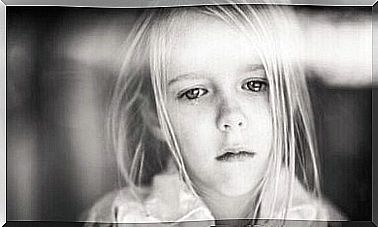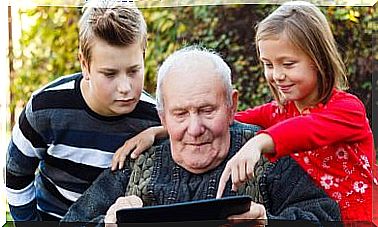Going Back To Life After A Trauma

Domestic, road or air accidents, witnessing life-threatening events, such as hurricanes or earthquakes, rape or kidnapping. All of these situations have one thing in common: they can become lasting and disabling trauma for the people who experience them. However, how do you get back to life after a trauma?
These experiences can be more or less painful depending on the personality and circumstances of each individual. If for some an event can represent a very big shock, for others the same event will be nothing but a relevant fact that, however, they will soon forget. What can be done to prevent these facts from paralyzing us and, therefore, to be able to move forward?
Can traumatic experiences change our personality?
Traumatic situations can produce significant changes in people’s personalities and lives, and their effects may continue even after several years have passed since the accident. On the one hand, they require a great deal of adaptive effort on the part of the person; on the other hand, the individual needs a reorganization of his abilities, potentialities and resources with which to face future challenges.
Sometimes this reorganization can help the person to grow in terms of assertiveness or capacity for effort and self-control. In other cases, however, it can make her feel insecure and vulnerable, which hinders life after the trauma. It can also trigger coping strategies that, far from helping you, harm you.

An obvious case in which trauma affects the victim’s personality is gender-based violence. These women are constantly subjected to potentially traumatic situations: when the partner comes home and screams, beats, harasses and humiliates. Therefore, they find some peace only when the husband leaves the house.
The assaults will certainly leave their mark on the personality of these women. In addition to physical injuries, alluding to the psychological sphere, such attacks can make a person pass from the role of dominator of his fears to a victim of them, from showing himself confident in his decisions to doubting and fearing the consequences of each of them, from extrovert to introvert. , etc.
Another example: having had a plane crash requires all passengers to face a new reality or situation, also accepting the trauma underlying a possible loss of loved ones, injuries or serious and chronic injuries.
Somehow, these people will be more prone in the following months or years to develop new fears (of flying, claustrophobia, avoiding social events) or they will have an obsessive disorder. As we see, living after trauma can be very complex.
How to come back to life after a trauma
When traumatic experiences are analyzed, they reduce their impact
Before the age of 6, traumatic experiences are almost unforgettable if they are not treated, because they are fixed in the unconscious and in the subconscious. For this reason, it is important to have some basic notions on what it is advisable to do and not to do in these extreme situations.
In the case of emergencies or disasters, it is advisable not to sleep during the first six hours after the crisis. Dreams play an important role in consolidating memory, so it’s best to stay awake or busy to avoid remembering shocking or traumatic images.
Even if victims wish to rest or sleep, it is best not to let them fall asleep during that period of time at least. It is not even worth giving them sleeping pills, but letting their sleep-wake cycle be the natural one.
Self-help in trauma
As we have said, a person’s response to a traumatic event can vary. For this reason, it is crucial that specialists understand that the symptoms are many, all equally acceptable and that each person must be given a personalized and particular treatment.
First of all, to return to life after a trauma, it is advisable that the person maintain his daily routine, that he does not change his habits suddenly in an attempt to avoid the situation experienced. She does not have to run away from the places or people that remind her of the trauma, but to treat her malaise with a professional.
To do this, the first step is to recognize that we cannot control everything that happens around us. On the other hand, it is advisable not to expose yourself to further stressful moments or events and to try to reduce the malaise by participating in playful activities, resting and resolving conflicts calmly.

Emotional disclosure is a very important part of the process
Last but not least, find support from loved ones. It will always be good to express your emotions, say what causes us pain, verbalize it, give it a name and surname. You think it is easier to deal with something if we know what it is; it will also facilitate the help of others when they know this something. However, we are not just talking about emotions or the object that causes them, but also about the thread that unites the two entities.
It may seem too simple, but only through exposure can the person find much of the lost security, especially if it is accepted and understood as logical by others.
Relief is produced when one communicates or writes a secret. They are both tools of self-knowledge and self-therapy and contribute positively to overcoming the trauma and returning to life. In fact, omitting traumatic, negative or upsetting events in one’s personal history can cause serious problems in the form of dissociation.
Post traumatic stress
After a traumatic event, there is a high probability that the victim feels strongly influenced by it : most of his inner world and a good part of the external one is contaminated by it. On the other hand, if the problems worsen, it is possible that there is post traumatic stress disorder, a massive case of acute stress whose effects can last for years and even a lifetime.
It is common for people to relive the situation that caused the trauma in the form of flashbacks. It is also common to have sleep disturbances or the feeling of having fallen into some kind of emotional numbness. The chronicity of these symptoms will depend on the intensity and / or severity of the event. Furthermore, let us not forget that stress acts cumulatively, that is, any stressful event following the trauma will add further anxiety to that caused by it, by its memory or by the limitations it produces.
We must think that no one is immune from a possible traumatic, unexpected and uncontrollable situation. In any case, the ideal will always be to consult a professional. This will give the necessary indications to proceed and will provide the most useful tools to return to life after a trauma.









